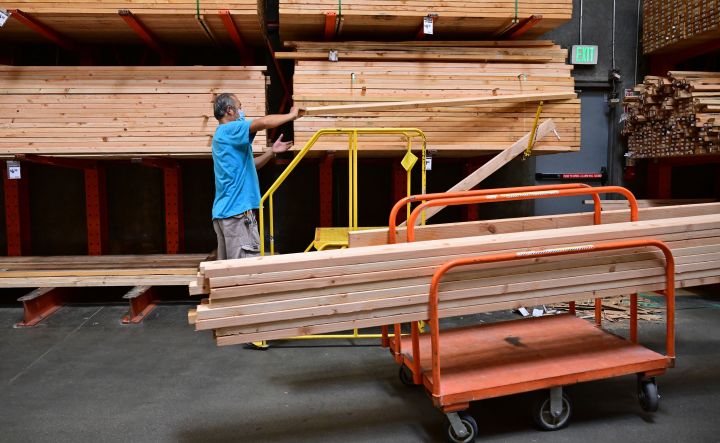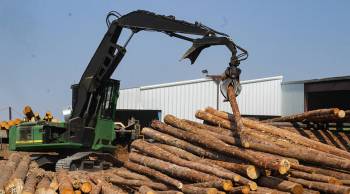
Tough housing market is pushing this lumber business to diversify
Tough housing market is pushing this lumber business to diversify

Back in 2021, Katrina Amaral, co-owner of Timberdoodle Farm in New Hampshire, talked about managing her sawmill business in the midst of high demand for lumber. But currently, the housing market is going through challenges with low supply and climbing mortgage rates, and the changing conditions are affecting the lumber business.
“Marketplace” host Kai Ryssdal speaks with Amaral about moving the business into new areas and peering into the crystal ball for 2023. The following is an edited transcript of their conversation.
Kai Ryssdal: So it’s been a year-ish, maybe a little more, since we spoke. How are things in the boutique sawmill world?
Katrina Amaral: They are still pretty busy, although we are definitely slowing down. Our business is pretty linked to new housing starts at the moment. And that hasn’t been as robust as it has in the last two years.
Ryssdal: Yes, she says with some degree of ‘Oh my goodness, what’s happening in my business?’ What is happening in your business now that housing is slowing down? Because if you listen to [Federal Reserve] Chair Jay Powell, it could go on a while.
Amaral: Yep. And so honestly, that’s somewhat OK. We have been diversifying, actually, to make sure that we are not completely linked to new housing starts. There’s a lot of other components to the wood business that we can take advantage of.
Ryssdal: Well, run me through some of them. How are you diversifying?
Amaral: Sure. So I think since we last talked, we actually became completely vertically integrated, which means that we can go to a property, cut the trees down, convert them to lumber and finished product lumber for the house. Yeah, it’s a lot.
Ryssdal: Yeah. Well, no, wait. Let’s take this one by one. How did you do that? Did you hire more people? Did you consult to figure out how to do that? I mean, what was the business model that you said, “All right, this is what we need to do”?
Amaral: Sure. We spend a lot of time investing in equipment that is appropriately sized for operation, including some low-impact forestry equipment that is more efficient, while still being really low ground impact and maneuverable in the woods. Also invested in some new processing equipment. And we also added a second kiln for drying lumber.
Ryssdal: All right, so basically, what you did is you spent money to make money.
Amaral: Yes.
Ryssdal: Now, is it working out for you?
Amaral: It is.
Ryssdal: What else have you done to diversify?
Amaral: We’ve got, well, another piece of equipment that is more focused on the capacity to deal with storm damage, as well as looking into some consulting work to help create local lumber networks with other sawmills or architects and designers.
Ryssdal: So you’re getting into services basically?
Amaral: A little bit.
Ryssdal: How did you get into this?
Amaral: So technically, my husband is a mechanical engineer, and he built himself a sawmill. And we started sawmilling. And we work well together, and we like making piles of things. So at the end of the day, there’s a very tangible output. And we both like to be in the woods.
Ryssdal: So as you look to 2023, with inflation still on the table and the economy slowing down, what are you thinking for Timberdoodle for next year?
Amaral: Um, it’s definitely, the crystal ball is fuzzy. Yeah, equipment parts have increased. We’re still feeling a lot of supply chain effects, especially for trying to modify equipment to make it appropriate for our business. It’s definitely going to be a challenge. But we can also pursue markets that are less, you know, value-added for us. So chicken coops, raised-bed lumber, you know, the stuff that people are always going to be building. It’s just not as high of a profit margin for us.
Ryssdal: What’s your stress level, Katrina?
Amaral: It’s not so bad right now. We’ve got a couple of projects still on the books, which helps, and ones that we’re looking forward to.
Ryssdal: Fair enough. Fair enough.
There’s a lot happening in the world. Through it all, Marketplace is here for you.
You rely on Marketplace to break down the world’s events and tell you how it affects you in a fact-based, approachable way. We rely on your financial support to keep making that possible.
Your donation today powers the independent journalism that you rely on. For just $5/month, you can help sustain Marketplace so we can keep reporting on the things that matter to you.

















